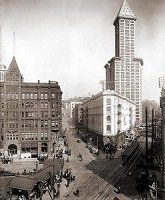
Billy McGrath


On 17th April, Palm Sunday, 1927 a man aged just forty-two collapsed and died at the side of a football pitch in Longview on the far, Pacific coast of the USA. Longview is a small town on the northern side of the Columbia River, so in Washington State, with Oregon on the other bank. Death was due to a heart-attack. But the man was not a spectator. He had just making his way off the field-of-play, a field that he should have been standing beside and not on. Indeed he should not have been chasing the leather at all. It is said that the heart condition that proved fatal had been known about. But the Seattle-based away-team he was by then managing, Electro-Dentists, the Maple Leafs as had been before sponsorship, was short of a man that day. Centre-half, Jimmy Craig, Scottish centre-half, was unable to make it. And the man in question, as, until recently a player of some note, stepped in to make up the numbers.
His name was Billy McGrath, William Patrick McGrath. The previous year he had been Vice-President of the Washington State Football Association. There is every chance he would have become President. But it was not to be. Billy McGrath was a handsome but smallish man, five feet five tall, brown hair, blue eyes. In his thirties and very much playing still he had carved himself a reputation as a centre- or left-half, clearly a passer but with a tackle in him. In his twenties he had been a forward, for his first ten seasons amongst the league's top scorers. And when not playing he would officiate of run the line. He would organise too. In fact in the ten or so clubs, with which he was associated with in one role or another, he did everything that needed to make the game he loved in the city he had come to call his home, where he had worked in the shipyard and lately for its Parks Dept..
But, of course, Billy McGrath was not Seattle-born. He had arrived there, the end of a 6,000 mile journey, via Tacoma and Port Blakely, also in Washington, having in 1906 crossed the border after a short stay en-route in Canada it is said in Saskatchewan and then crossing from Fernie in British Columbia. He arrived aged twenty with his equally young wife, Margaret. Indeed, their first child, John, named for Billy's father, had been born in Canada apparently in 1905. Christina would follow in 1908 in Tacoma and finally Robert in Port Blakely in 1914. However, both their parents had been seen life in Glasgow, Billy in 1886, the son of John and Susie McGrath, both Irish-born, and Margaret, or Margarette, nee Porter, daughter of James and Christina, two years later and had married in Partick in July 1904.
And it may have been this marriage that was the key to their emigration. Billy was eighteen. Margaret was just sixteen and she was pregnant. First son, John, was actually born in on 14th November, 1904, just three and half months after the wedding, in Canada certainly but more precisely but for no obvious reason in Broadview, a small town indeed in Saskatchewan. And, as if pregnancy might not have been the reason on marriage for the young pair to be sent on their way, there was perhaps a second. The wedding was in a Congregational Union chapel. There is every indication that she was Protestant with Billy being of Irish stock almost certainly Catholic. The couple was "mixed", anathema then and for half a century more with emigration a frequently employed solution. It and Brazil would work for my Grangemouth grandparents. It and the West Cast of America seems equally to have worked for the McGraths.
It is of course impossible to know how good a player Billy McGrath might have been in Scotland. He left, beyond doubt fully infected by Scottish the football contagion, but before he might have been picked up by a major club. However, it may be coincidence but where Billy McGrath went in Washington State he registered on the field and football itself seemed to thrive. 1905 had seen the foundation of the Northwestern Senior League with five teams taking part, Seattle AFC, Wanderers, Thistles, Fort Lawton and Tacoma. In its first two years Seattle took the title, the first by beating the Scots Thistles, but in 1907 with McGrath in the city Tacoma took the title and did so again in 1909. By 1910 seven clubs were involved. From Seattle there were Celtics, Rangers, Ranier and Shamrocks, plus Tacoma still and now Port Blakely. In 1912 the miners from Black Diamond joined the fray and then those from Carbonado and for four years they would dominate before Tacoma re-emerged, by which time the McGraths were now settled in the State capital. And there they would stay. After Billy's death and the soccer community not just of Seattle but in wider Washington came together to raise money for his widow and family through several benefit matches. And whilst their daughter would die just fifteen months after her father Margaret is said to have lived a long life, John would die in 1987 still in Seattle at the age officially of eighty-two but actually a year older, survived by a son, Jack, and Robert in the city once more in 1985.
